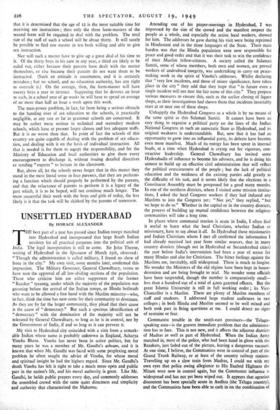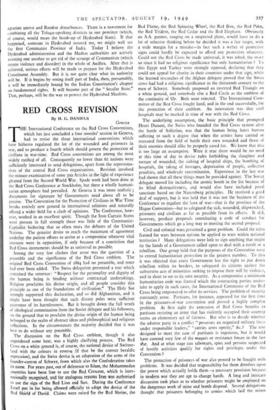UNSETTLED HYDERABAD
By HORACE ALEXANDER
THE best part of a year has passed since Indian troops marched into Hyderabad and incorporated that large South Indian territory for all practical purposes into the political unit of India. The legal incorporation is still to come. Sir John Thorne, writing of Hyderabad in the Spec:calor of March 25th, observed: " Though the administration is called military, I found no show of force in the city." My own visit, some months later, confirmed this impression. The Military Governor, General Chowdhury, seems to have won the approval of all law-abiding sections of the population. Those who criticise him are either supporters of the former " Razakar " tyranny, under which the majority of the population was groaning before the arrival of the Indian troops, or Hindu hotheads who want to be allowed a free hand with the Muslim minority—who, in fact, think the time has now come for their community to dominate. As they are by far the larger community, they plead that their cause is the cause of " democracy." But such a specious identification of " democracy" with the domination of the majority will not be tolerated by General Chowdhury, so long as he is in control, nor by the Government of India, if and so long as it can prevent it.
My visit to Hyderabad city coincided with a visit from a remark- able Indian whose name is probably unknown in England, Acharya Vinoba Bhave. Vinoba has never been in active politics, but for many years he was a member of Mr. Gandhi's ashram, and it is known that when Mr. Gandhi was faced with some perplexing moral problem he often sought the advice of Vinoba, for whose moral and spiritual insight he had the highest regard. Since Mr. Gandhi's death Vinoba has felt it right to take a much more open and public part in the nation's life, and his moral authority is great. Like Mr. Gandhi, he holds public prayers every day, and commonly addresses the assembled crowd with the same quiet directness and simplicity and authority that characterised the Mahatma. Attending one of his prayer-meetings in Hyderabad, I was impressed by the size of the crowd and the manifest respect the people as a whole, and especially the active local workers, showed for him. The addresses he gave during his visit were being reprinted in Hindustani and in the three languages of the State. Their- main burden was that the Hindu population were now responsible for peace and good order and that it was their task to win the confidence of their Muslim fellow-citizens. A society called the Salamati Samiti, some of whose members, both men and women, are proved workers of undoubted integrity, was undertaking to carry on peace- making work in the spirit of Vinoba's addresses. Whilst declaring that " very few incidents, and those of minor significance, have taken place in the city " they add that they hope that " in future even a single incident will not mar the fair name of this city." They propose various measures to ensure this, such as the earlier closing of liquor shops, as their investigations had shown them that incidents invariably start at or near one of these shops.
Unhappily the Hyderabad Congress as a whole is by no means of the same spirit as this Salamati Samiti. It cannot have been an easy thing to organise a political party on the lines of the Indian National Congress in such an autocratic State as Hyderabad, and its original weakness is understandable. But, now that it has had an opportunity to grow into an influential party, its defects have become even more manifest. Much of its energy has been spent in internal feuds, at a time when Hyderabad is crying out for vigorous, con- structive leadership. General Chowdhury has invited some Hyderabadis of influence to become his advisers, and he is doing his utmost to build up an effective civil administration that will reflect the political consciousness of the people ; but the lack of political education and the weakness of the existing parties add greatly to the difficulty of his task, and it seems likely that the elections to a Constituent Assembly must be postponed for a good many months. In one of the northern districts, where I visited some mission institu- tions, I asked the local Congress workers if they had induced any Muslims to join the Congress yet : " Not yet," they replied, " but we hope to do so." Whether in the capital or in the country districts, the process of building up mutual confidence between the religious communities will take a long time.
In places where communal tension is acute in India, I often find it useful to learn what the local Christians, whether Indian or missionary, have to say about it all. In Hyderabad those missionaries and Indian Christians whom I met all confirmed the information I had already received last year from similar sources, that in many country districts (though not in Hyderabad or Secunderabad cities) the year before India's intervention had been a year of terror for many Hindus and also for Christians. The bitter feelings against the Muslims are, inevitably, still widespread. There is much to forgive. No wonder the Ministers of the old regime have been kept in house- detention and are being brought to trial. No wonder some officials have been suspended, though the number is comparatively small— less than a hundred out of a total of 4,000 gazetted officers. But the great Islamia University is still in full working order ; its Vice-
Chancellor is a Muslim. There are plenty of Muslim members of staff and students. I addressed large student audiences in two colleges ; in both Hindu and Muslim seemed to be well mixed and both took part in firing questions at me. I could detect no signs of restraint or fear.
Communist trouble in the south-east provinces—the Telugu- speaking area—is the gravest immediate problem that the administra- tion has to face. This is not new, and it affects the adjacent districts of Madras as well as part of Hyderabad. When the Indian Army marched in, most of the police, who had been hand in glove with the Razakars, just faded out of the picture, leaving a dangerous vacuum. At one time, I believe, the Communists were in control of part of the Grand Trunk Railway, or at least of the country railway stations. Travelling up on a slow train from Madras, I could see with my own eyes that police owing allegiance to His Exalted Highness the Nizam were now in control again, but the Communist influence is widespread and has not yet been wiped out. It appears that agrarian discontent has been specially acute in Andhra (the Telugu country), and the Communists have been able to cash in on the combination of agrarian unrest and Razakar disturbances. There is a movement for combining all the Telugu-speaking districts in one province (which, of course, would mean the break-up of Hyderabad State). If that happened, someone in Hyderabad assured me, we might well see the first Communist Province of India. Today I believe the Hyderabad administration and the Madras authorities are actively assisting one another to get rid of the scourge of Communism (which means violence and disorder) in the whole of Andhra. After that is achieved, serious efforts will be made to prepare for the Hyderabad Constituent Assembly. But it is not quite clear what its authority will be. If it begins by voting itself part of India, then, presumably, it will be immediately bound by the Indian Constitution's chapter on fundamental rights. It will become part of the " Secular State." That, perhaps, will be the way to protect the Hyderabad Muslims.



































 Previous page
Previous page